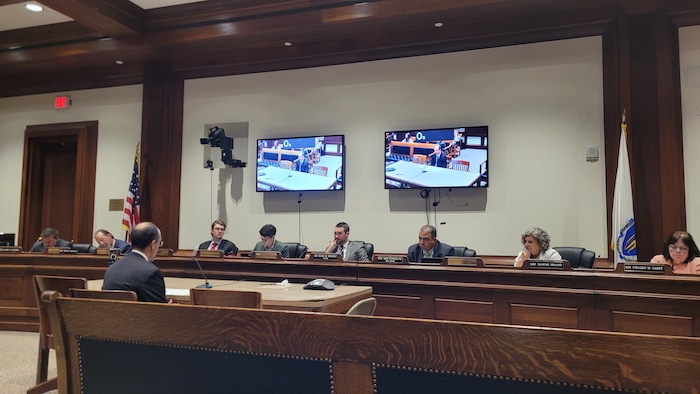
“Lab shopping is widespread here … The financial incentives are strong and there are no real incentives for honesty or accuracy.”
With several cannabis-related bills before the Massachusetts House and Senate this session, on Tuesday the legislature’s Joint Committee on Cannabis Policy fielded testimony on proposals including An act relative to data transparency in the cannabis industry (click here for the Senate version).
The testing-related measure, which would make it so the state’s Cannabis Control Commission has to “collect, compile, and make available to the public on its Open Data Platform” information ranging from statewide average failure rates for pesticides and heavy metals found in samples to contaminant and cannabinoid potency data from individual testing labs, was among a few proposed bills that received the most attention and impassioned testimony.
[Click here for our coverage of testimony on a bill that would expand access to medical marijuana]
“This has to do with making research data related to the state’s cannabis testing labs more transparent.” Grant Smith Ellis, an independent journalist who covers the Mass industry and is also a disabled medical patient, expressed concern about “manipulation occurring in the testing of both contaminants and THC results.” “It is imperative,” he added, “that the legislature take steps to help the CCC create a state-run standards lab and accreditation for those labs,” and also “take steps to open up this data.”
Dan Delaney, the executive director of the Association of Cannabis Testing Laboratories, spoke about how “lab shopping and lab fraud undermine the very purpose of a regulated market.” “All too often,” Delaney said, “the products that consumers are purchasing are not accurately labeled for either potency or contaminants. Mislabeling poses a problem to both public health and consumer protection.”
The trade association director added, “I’ve heard lab after lab say that they have been approached by current or potential clients saying that they demand certain potency levels or pass rates for their business. That puts labs in the untenable position of choosing between maintaining their client list or maintaining their scientific integrity.”

Delaney said he “brought this issue to the CCC a year ago,” specifically suggesting two viable solutions—that they use the “existing CCC secret shopper program for off-the-shelf testing,” and “make testing data available to the public so that patterns of unlikely and impossible testing results could be identified and addressed.” He also approached lawmakers in 2022, and as a result said CCC members “had feelings” about him seeking legislative solutions before going to commissioners. The lack of regulator action, he said, spurred his testimony on Tuesday.
Following Delaney, MCR Labs Founder and CEO Michael Kahn spoke about his company’s experience in Mass, where they opened in 2013, as well as in other states. In Pennsylvania, for example, he said MCR saw “the writing was on the wall” in 2021, when large cultivators made it clear that they “didn’t want accurate testing.” MCR ultimately closed that operation; “I don’t believe that honest and accurate laboratories can operate in the Pennsylvania cannabis market space,” Kahn said.
His assessment of the Bay State wasn’t too much better. Kahn continued, “We have had many such experiences in Massachusetts. The selection of labs based on the results that producers want is called lab shopping and is widespread here. The financial incentives are strong and there are no real discernible incentives for honesty or accuracy.”
Kahn concluded by saying that in other states, “the most effective solution to dishonesty is transparency,” and commended the committee on taking up this particular bill for which he also submitted detailed suggested adjustments.
Also speaking in support of the act relative to data transparency, Megan Dobro, the CEO of SafeTiva Labs in Westfield, offered more specifics: “Without standardization in how labs are supposed to calculate cannabinoids or which species must be included in each microbial category, or how sample prep is supposed to happen, there will be wide variability in the results between labs. I fully support the CCC to dig deeper into the practices that are causing so much variability and then give us data informed scientifically-based guidance towards standardization.”
Dobro added, “How often does a group in a highly regulated industry come forward and ask to please regulate us more? We recognize there’s a problem that threatens our industry and it can be solved with more oversight.”
At the same time, Dobro warned against making individual lab rankings public, arguing that such “results will make lab shopping easier.” Bob Miller, the COO of Science and Operations for ACT Laboratories, expressed similar sentiments. ACT is currently operating in five states with three more including Massachusetts coming soon, and Miller said that every market ACT is in is looking to modify and strengthen regulations. “The idea of making data available at the state level makes perfect sense to me,” he said. “You need an informed consumer. And that information should be very, very helpful.”
But Miller also warned of “unintended consequences,” saying that “reporting the data as it relates to potency levels or failures of contamination at the laboratory level actually can cause some problems.” He offered the example of growers in Michigan gravitating to labs where they saw higher-potency testing occurring.
All together, it’s a lot for the joint committee to chew on as members consider a version to push in the legislature—or not, in which case the CCC would be left to act (or not act) on its own.
“The corrupt labs will push back against [changes],” Smith Ellis said in his testimony. “The labs that are doing the right thing will want this done. You’ll be able to weed out the bad actors.”

























